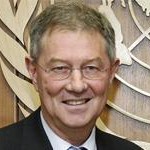
In April 2009 a four-person mission including Jean-François Fechino, an international specialist in the effects of banned weapons upon the environment and sustainable development, visied Gaza under the auspices of the Arab Commission for Human Rights. The samples of earth and dust that they brought back from Gaza were analyzed by a specialist laboratory.
While a United Nations committee under Richard Goldstone, the former International War Crimes Prosecutor, has not been authorized by the Israeli government to investigate such incidents in Gaza, the findings of the ACHR team raises the possibility that
the use of depleted uranium, in addition to white phosphorous bombs, by the Israeli military during Operation Cast Lead will be confirmed.
The report concluded that Palestinian fighters had only unsophisticated weapons, such as Qassam and Grad rockets, while Israel was able to employ the most modern weaponry to bombard the population of Gaza from the air, land, and sea.
Israel initially denied it had used white phosphorous in the offensive; it later admitted its use but denied this was unlawful. The Committee was satisfied on the available evidence that white phosphorous was used as an incendiary weapon in densely populated areas.
The Committee found that the Israeli Defense Forces were responsible for the killing, wounding, and terrorizing of civilians. The Committee based this finding on the number of civilians killed by 22 days of intense bombardment by air, sea, and land. The Committee also found the weapons used by the IDF, particularly white phosphorous and flechettes, caused superfluous and unnecessary suffering.
The Committee echoed the assertions of other reports on white phosphorous, for example, the Amnesty Report which several instances of its use in carrier shells “throughout Gaza”, including:
The United Nations Relief and Works Administration primary school in Beit Lahiyeh, where approximately 1,600 people were seeking shelter from the ongoing fighting. Two brothers, aged 5 and 7, were killed and 14 others were injured when a white phosphorous shell landed in a second-floor classroom;
The UNRWA field operations headquarters where tens of tons of medicines, food and non-food items were destroyed;
The residential areas in and around Gaza City and in the north (at Jabalya refugee camp) and the south (at Khuzaa, east of Khan Younis) of the Gaza Strip.
In March 2009, Human Rights Watch (HRW) published a report entitled “Rain of Fire. Israel’s Unlawful Use of White Phosphorous in Gaza.” The report detailed the confirmed uses of white phosphorous in Gaza during the conflict “in densely populated areas”, at the “edges of populated areas", and “in open areas.”
HRW reported six cases where white phosphorous was allegedly used in urban and outlying areas.
• In the Tel al-Hawa Neighborhood, Gaza City on 15 and 16 January 2009;
• At the Al-Quds Hospital, Tel al-Hawa Neighborhood, Gaza City on 15 January 2009;
• At the UNRWA Headquarters Compound, Gaza City on 15 January 2009
• At the Beit Lahiyeh UNRWA School on 17 January 2009;
• Siyafa Village, Beit Lahiyeh on 10 January 2009;
• Khuza’a Village, between 11 and 13 January 2009.
HRW concluded that the use of white phosphorous in “densely populated neighborhoods, including downtown Gaza City, violated international humanitarian law (the laws of war), which requires taking all feasible precautions to avoid civilian harm and prohibits indiscriminate attacks.”
 Saturday, May 30, 2009 at 12:33
Saturday, May 30, 2009 at 12:33 
 In April 2009 a four-person mission including Jean-François Fechino, an international specialist in the effects of banned weapons upon the environment and sustainable development, visied Gaza under the auspices of the Arab Commission for Human Rights. The samples of earth and dust that they brought back from Gaza were analyzed by a specialist laboratory.
In April 2009 a four-person mission including Jean-François Fechino, an international specialist in the effects of banned weapons upon the environment and sustainable development, visied Gaza under the auspices of the Arab Commission for Human Rights. The samples of earth and dust that they brought back from Gaza were analyzed by a specialist laboratory.